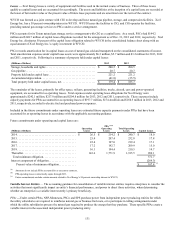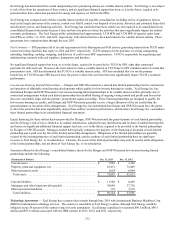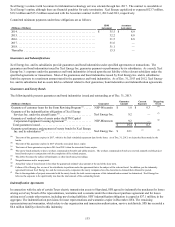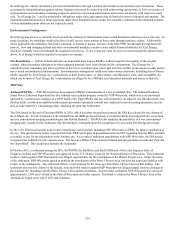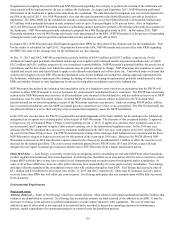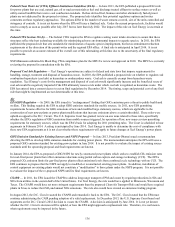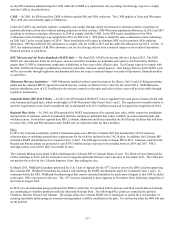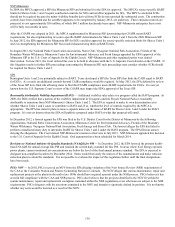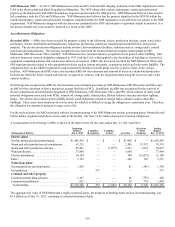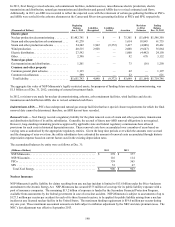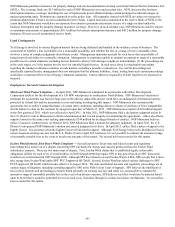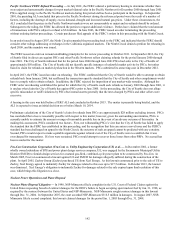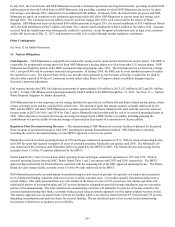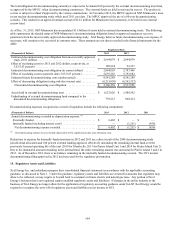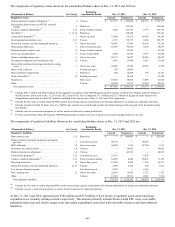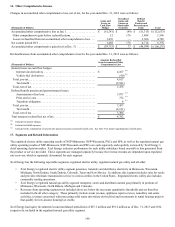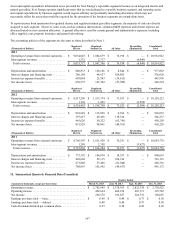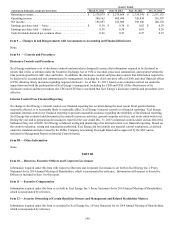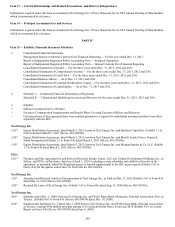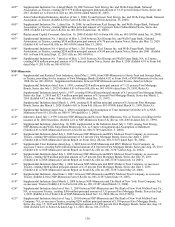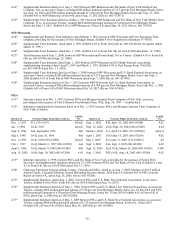Xcel Energy 2013 Annual Report Download - page 159
Download and view the complete annual report
Please find page 159 of the 2013 Xcel Energy annual report below. You can navigate through the pages in the report by either clicking on the pages listed below, or by using the keyword search tool below to find specific information within the annual report.141
NSP-Minnesota purchases insurance for property damage and site decontamination cleanup costs from Nuclear Electric Insurance Ltd.
(NEIL). The coverage limits are $2.3 billion for each of NSP-Minnesota’s two nuclear plant sites. NEIL also provides business
interruption insurance coverage, including the cost of replacement power obtained during certain prolonged accidental outages of
nuclear generating units. Premiums are expensed over the policy term. All companies insured with NEIL are subject to retroactive
premium adjustments if losses exceed accumulated reserve funds. Capital has been accumulated in the reserve funds of NEIL to the
extent that NSP-Minnesota would have no exposure for retroactive premium assessments in case of a single incident under the
business interruption and the property damage insurance coverage. However, in each calendar year, NSP-Minnesota could be subject
to maximum assessments of approximately $16.1 million for business interruption insurance and $40.2 million for property damage
insurance if losses exceed accumulated reserve funds.
Legal Contingencies
Xcel Energy is involved in various litigation matters that are being defended and handled in the ordinary course of business. The
assessment of whether a loss is probable or is a reasonable possibility, and whether the loss or a range of loss is estimable, often
involves a series of complex judgments about future events. Management maintains accruals for such losses that are probable of
being incurred and subject to reasonable estimation. Management is sometimes unable to estimate an amount or range of a reasonably
possible loss in certain situations, including but not limited to when (1) the damages sought are indeterminate, (2) the proceedings are
in the early stages, or (3) the matters involve novel or unsettled legal theories. In such cases, there is considerable uncertainty
regarding the timing or ultimate resolution of such matters, including a possible eventual loss. For current proceedings not
specifically reported herein, management does not anticipate that the ultimate liabilities, if any, arising from such current proceedings
would have a material effect on Xcel Energy’s financial statements. Unless otherwise required by GAAP, legal fees are expensed as
incurred.
Employment, Tort and Commercial Litigation
Merricourt Wind Project Litigation — In April 2011, NSP-Minnesota terminated its agreements with enXco Development
Corporation (enXco) for the development of a 150 MW wind project in southeastern North Dakota. NSP-Minnesota’s decision to
terminate the agreements was based in large part on the adverse impact this project could have on endangered or threatened species
protected by federal law and the uncertainty in cost and timing in mitigating this impact. NSP-Minnesota also terminated the
agreements due to enXco’s nonperformance of certain other conditions, including failure to obtain a Certificate of Site Compatibility
and the failure to close on the contracts by an agreed upon date of March 31, 2011. NSP-Minnesota recorded a $101 million deposit
in the first quarter of 2011, which was collected in April 2011. In May 2011, NSP-Minnesota filed a declaratory judgment action in
the U.S. District Court in Minnesota to obtain a determination that it acted properly in terminating the agreements. enXco also filed a
separate lawsuit in the same court seeking approximately $240 million for an alleged breach of contract. NSP-Minnesota believes
enXco’s lawsuit is without merit. In October 2012, NSP-Minnesota filed a motion for summary judgment. In April 2013, the U.S.
District Court granted NSP-Minnesota’s motion and entered judgment in its favor. In April 2013, enXco filed a notice of appeal to the
Eighth Circuit. It is uncertain when the Eighth Circuit will decide this appeal. Although Xcel Energy believes the likelihood of loss is
remote based on existing case law and the U.S. District Court’s April 2013 decision, it is not possible to estimate the amount or range
of reasonably possible loss in the event of an adverse outcome of this matter. No accrual has been recorded for this matter.
Exelon Wind (formerly John Deere Wind) Complaint — Several lawsuits in Texas state and federal courts and regulatory
proceedings have arisen out of a dispute concerning SPS’ payments for energy and capacity produced from the Exelon Wind
subsidiaries’ projects. There are two main areas of dispute. First, Exelon Wind claims that it established legally enforceable
obligations (LEOs) for each of its 12 wind facilities in 2005 through 2008 that require SPS to buy power based on SPS’ forecasted
avoided cost as determined in 2005 through 2008. Although SPS has refused to accept Exelon Wind’s LEOs, SPS accepts that it must
take energy from Exelon Wind under SPS’ PUCT-approved QF Tariff. Second, Exelon Wind has raised various challenges to SPS’
PUCT-approved QF Tariff, which became effective in August 2010. The state and federal lawsuits and regulatory proceedings are in
various stages of litigation, including a pending appeal by SPS in the Fifth Circuit Court of Appeals. SPS believes the likelihood of
loss in these lawsuits and proceedings is remote based primarily on existing case law and while it is not possible to estimate the
amount or range of reasonably possible loss in the event of an adverse outcome, SPS believes such loss would not be material based
upon its belief that it would be permitted to recover such costs, if needed, through its various fuel clause mechanisms. No accrual has
been recorded for this matter.


